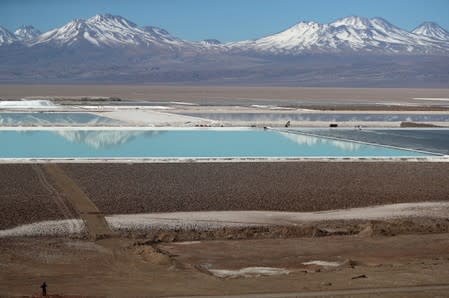In This Article:
By Ernest Scheyder
SANTIAGO (Reuters) - Opaque pricing for lithium, the powerhouse metal fueling the electric vehicle revolution, is expected to be top of mind this week as the industry's leaders gather in Santiago, with calls rising for more transparency to attract much-needed expansion funding.
Unlike for copper or other metals used to make electric cars, there is no traded price for lithium. The London Metal Exchange is working to develop a tradable price for the white metal, but until then, the industry's investors, customers, analysts and executives are left without a full sense of the global market.
"The fact that there isn't a benchmark price means that some of the banks haven't been keen to get involved because they can't hedge their price risk," said William Adams, an analyst at Fastmarkets, which is hosting the Santiago conference and vying to be a pricing provider for the LME contract.
For now, the industry grabs on to whatever scuttlebutt it can find, with data swirling on prices for spodumene, a hard rock containing lithium; prices for hydroxide or carbonate, the two main types of lithium used in batteries; or prices paid by battery manufacturers across China, Japan and South Korea.
"You're almost forced to just take the average of the price estimates that are out there," said James Calaway, chairman of ioneer Ltd, which is developing a lithium project in Nevada.
While spot prices in China have dropped double digits since January due to uncertainty around the country's electric vehicle subsidies, such prices reflect only a portion of global demand.
Some companies, including global leader Albemarle Corp, sell nearly all of their lithium on long-term contracts and are not influenced by Chinese spot prices, a distinction many on Wall Street do not seem to make.
Albemarle's stock is down 12 percent since January.
"The China spot price is what the market is watching and until it picks up in a meaningful way, the sentiment will be negative," said Howard Klein, a lithium analyst and partner with New York-based advisory firm RK Equity. "But the demand is there."
SQM, which eschews long-term contracts, said its first-quarter lithium prices slipped 11 percent, leading it to pause expansion plans in Chile's Atacama desert.
Livent Corp, which operates in Argentina, cut its 2019 forecast and warned that demand was slipping for a version of lithium it produces in China, and would sell product elsewhere.
Since January, SQM's shares are down 19 percent and Livent's shares have lost 53 percent.


